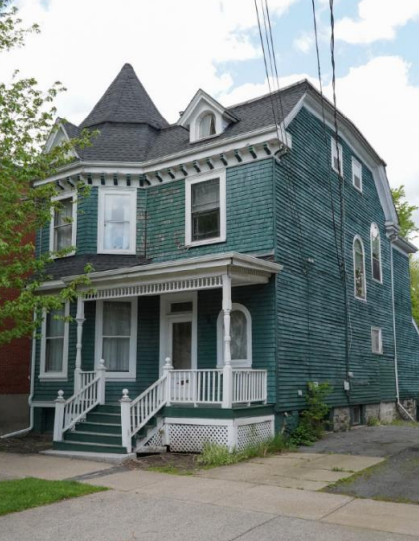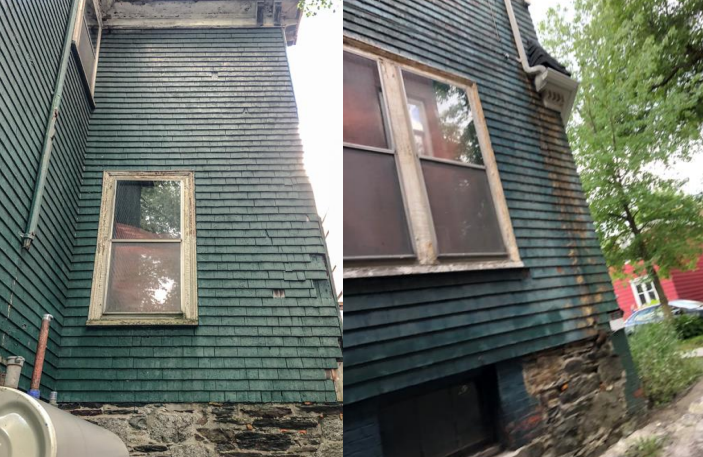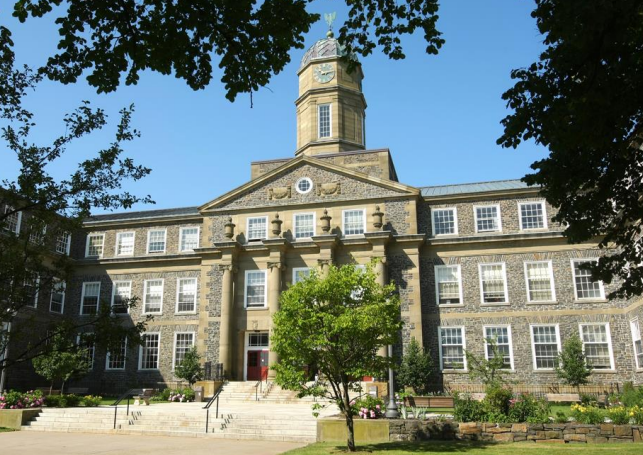Halifax Regional Council has voted to designate a 125-year-old building owned by Dalhousie University as a heritage property, after outcry from residents over its pending demolition.

Dalhousie University bought the building at 1245 Edward St. in 2021, following the death of its previous owner. The school had applied for a demolition permit, but it has not yet been granted.
In July, the municipality served two notices to the school for doing interior demolition work without a permit. Dalhousie has said it was doing work to prepare the house for the removal of mould and asbestos.
Community member Peggy Walt applied for the heritage designation in July along with her husband and launched a petition to save the building, which has received more than 6,000 signatures.
She described the 2.5-storey house as a “beautiful family home” that “has a lot of history and heritage connected to the early development of Halifax.”
“It’s the grandest house on our street, and it really stands out and is something people love to walk by and look at,” she said.

In a presentation to council Tuesday, Seamus McGreal, senior heritage planner with the city’s heritage property program, said the home has “historical associations with prominent Halifax families” in the late 19th and early 20th centuries, including the Boak and Hobrecker families.
The home’s previous owner, Susan Sapp, also ran a nursery home out of the school and boarded female international students from Dalhousie, said Walt.
Building a ‘failed structure’: lawyer
However, at the council meeting Tuesday, McInnes Cooper partner Peter Rogers, representing Dalhousie University, argued the home should not be given heritage status, calling it a “failed structure” and taking note of the “poor state of the building.”
He showed pictures of “the random application of clapboard over wood shingles on some of the walls, the aluminum storm windows hiding the deteriorating window conditions beneath, and the insertion of orange spray foam into gaps in the foundation walls, as well as the haphazard brick and concrete block inserts into the foundation wall itself.”

Get daily National news
Rogers also said there were “inconsistent interventions carried out upon the original structure,” which includes a “major buildover” of the original steeply-pitched roof.

While the city’s heritage advisory committee gave the structure 64 points out of 100 based on its evaluation criteria for registration – which factors in things like age, its architectural style and relationship to the surrounding area – Rogers said a professional heritage architect from +VG Architects gave it a score of 32.
Rogers says Dalhousie has a number of other historic buildings which add a lot to the area, but the property on Edward Street is not one of them.
The lawyer also took issue with the fact that the heritage application came from a third party, rather than the owner.
“Registering a property as a municipal heritage property can be done – we know that – without the owner’s consent,” he said. “But just because it can be, doesn’t mean it should be. It doesn’t mean it’s wise to do it.”
He said council should be “wary” of allowing third-party applications for heritage status, saying it can provide a forum for neighbours to oppose densification. “That is already a major problem for housing in metro (Halifax),” he said.
Dalhousie “strongly feels” it was not given adequate process rights on the fate of its property, he added.

Rogers also said the two notices served to Dalhousie over doing work without a permit had “no merit” and they plan to contest them.
“There was nothing sneaky or wrongful about Dal’s demolition permit application, or about what Dalhousie was doing on-site,” he said.
“It was openly removing mouldy and asbestos-contaminated building materials from inside the building while awaiting issuance of a demolition permit, which it intended to apply for from the very moment it bought the property – this uninhabitable former rooming house.”
However, Walt took issue with that characterization of the home, saying it’s insulting to the families who “lovingly” cared for it.
- Khamenei’s death met with ‘jubilation’ among Iranian-Canadians: Liberal MP
- ‘At first I cried’: How Iranian Canadians are reacting to the U.S. strikes in Iran
- Iran begins search for new leader; U.S. military says 3 service members killed
- Queen’s University students stranded in Doha after Iran attack shuts down airspace
She also said she was inside the home the day before Dalhousie took possession and didn’t see any of the described interior damage.
“They apparently didn’t heat the house over the winter, so we believe they probably had a burst pipe, and that caused damage, and instead of fixing it, they left it,” she said.
“So, sure, if you’re not going to not heat a house and have a burst pipe and have damage, then you may get some mould.”
Some councillors also took offence to Rogers’ criticism of the heritage designation process, with Coun. Waye Mason saying “the process has been followed as it is laid out.”
‘No immediate plans’ for building
Questioned about the school’s plan for the building, Gitta Kulczycki, vice-president of finance and administration at Dalhousie, said it was purchased as part of a long-term vision for the school.
“We have no immediate plans for the property, however, Dalhousie – having been here for 200 years, and hopefully being here for another 200 years – will of course require additional lands over time as we continue to develop along with the city, along with the province,” she said.
In the end, councillors ended up passing the motion to designate the building as a heritage property, with councillors Trish Purdy, Tony Mancini, Paul Russell and Tim Outhit voting against.
While the building now has heritage status, it will not be protected forever.
Under the Heritage Property Act, property owners may still apply to alter or demolish the building. If the municipality does not approve the application, the property owner can alter or demolish the building after three years from the date of the application. They would have one year to do so.
But Walt is hopeful that won’t happen.
“This is an opportunity for the university to turn the situation around now, and to say, ‘OK, we perhaps misjudged how much public support there would be for this old house, and let’s think about a creative solution,’” she said.
“It’s perfectly adaptable. They have room in the back to build up, they could have a multiplex there. My fondest wish would be a home for international students, possibly named after Mrs. Sapp. They could have it as a faculty/departmental building.
“There’s lots of uses they could come forward with, and the neighbours are ready to meet with them and talk about all these ideas.”
In a statement Wednesday, Dalhousie University spokesperson Kristen Lipscombe said the university is committed to “continuing to work with government staff on finding the right balance between preservation of our most iconic buildings and development that supports continued university and city growth.
“We do not have any immediate plans for the Edward Street property and need to consider our options based on Tuesday’s decision,” she said. “In its current form, the building serves no practical purpose to the university.”








Comments
Want to discuss? Please read our Commenting Policy first.